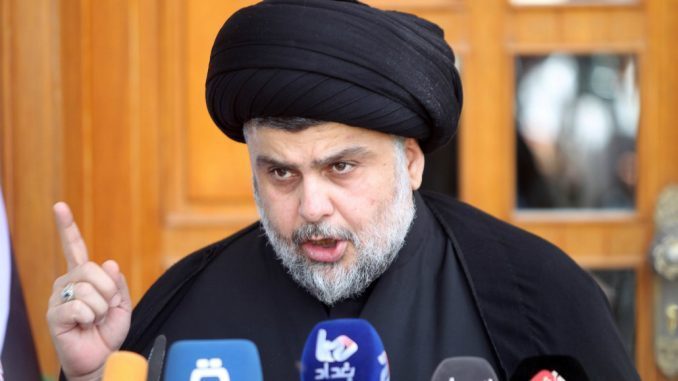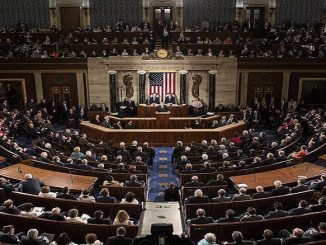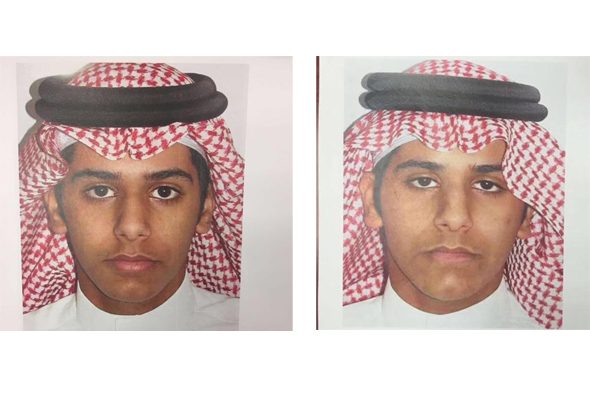
Influential Iraqi cleric Moqtada Sadr on Saturday called on Syria’s Bashar al-Assad to step down, urging Washington and Moscow to stop intervening in the Syrian conflict.
The Najaf-based cleric condemned the killing of 87 people, including 31 children, in a chemical attack last week in a rebel-held Syrian town that was carried out by Assad regime.
“I would consider it fair for President Bashar al-Assad to resign and leave power, allowing the dear people of Syria to avoid the scourge of war and terrorist oppression,” he said in a statement.
Sadr also condemned the US missile strike on Syria on Friday, urging all foreign parties involved in the Syria conflict to pull out. “I call on all sides to withdraw their military assets from Syria so that the Syrian people take things into their own hands. They are the only ones with the right to decide their fate — the alternative will turn Syria to rubble,” he said.
The United States fired a barrage of 59 cruise missiles at Shayrat airbase in Syria early on Friday as a response to the chemical attack and a warning for Assad regime if it carried out similar attacks again.
Sadr said the U.S. strikes would “drag the region to war” and could help “the expansion of ISIS,” the militant Islamic State group, which controls parts of Iraq and Syria.
Iraq’s Shi’ite-led governments have maintained good relations with the Syrian government throughout the six-year Syrian crisis. Sadr is the only Iraqi Shi’ite leader to keep some distance from Iran, a main backer of Assad along with Russia.
Several Iraqi Shia militias, some of them directly supported by Iran, are helping Assad’s camp in the Syria conflict by sending fighting units across the border.
Sadr, however, is seen as a “nationalist”. His forces have focused on “protecting the holy sites” and his drive against “corruption and nepotism” has drawn support from beyond his traditional base.
The Shi’ite-led Iraqi government issued a statement on Friday that reflected the difficult balancing act it maintains between its alliance with the United States and with Shi’ite Iran. It condemned the chemical attack, without naming Assad, calling instead for an international investigation to identify the perpetrator.
The statement also criticized “the hasty interventions” that followed the chemical attack, in an apparent reference to the U.S. strikes.
Sectarian militias in Iraq and the political reform
During 2005 and 2006 Sadr’s self-styled Mahdi army was involved in the sectarian killings which engulfed Baghdad. Hundreds of Sunnis were murdered by militias loyal to various Shia leaders. Hundreds of Shias were murdered in return.
But last month Sadr said that sectarian militias have no place in Iraq.
Speaking from his home in Najaf he said that he favors urgent dialogue with Iraq’s Sunni politicians so as to prevent clashes sectarian clashes once the country no longer has a common enemy.
“I’m afraid that the defeat of ISIS [Islamic State] is only the start of a new phase. My proposal is inspired by fear of sectarian and ethnic conflict after Mosul’s liberation,” he said.
“I want to avoid this. I am very proud of Iraq’s diversity but my fear is that we may see a genocide of some ethnic or sectarian groups.”
In addition, he had lost some of his political influence in recent years but has brought himself back into relevance by calling for demonstrations to push for reforms.
Al-Sadr has told thousands of supporters last month in Iraq’s capital, Baghdad, that he will boycott upcoming elections unless the country’s electoral law is changed.
Supporters of the Shia cleric have repeatedly rallied for changes to the law and the country’s electoral committee, which is dominated by affiliates of powerful political parties.
If “the law remains … this means that we will order a boycott of the elections,” Sadr said in remarks televised at a demonstration in Baghdad’s Tahrir Square last month.
Rallies demanding improved services and opposing widespread corruption broke out in the summer of 2015, drawing pledges from authorities that reforms would be made that ultimately led to little in the way of lasting change.
Last year, his supporters broke into Baghdad’s fortified Green Zone area on several occasions, where the government is headquartered, while clashes at a Baghdad protest in February left seven people dead.



